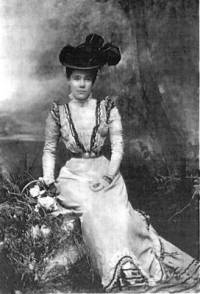 Born on April 9th 1860 in Chapel Ash, Wolverhampton and christened on the 9th May at St Mark's, Wolverhampton, Stafford, Ellen Thorneycroft Fowler was the daughter of Henry Hartley Fowler from Sunderland and Ellen Thorneycroft from Stafford.
Born on April 9th 1860 in Chapel Ash, Wolverhampton and christened on the 9th May at St Mark's, Wolverhampton, Stafford, Ellen Thorneycroft Fowler was the daughter of Henry Hartley Fowler from Sunderland and Ellen Thorneycroft from Stafford. Born on April 9th 1860 in Chapel Ash, Wolverhampton and christened on the 9th May at St Mark's, Wolverhampton, Stafford, Ellen Thorneycroft Fowler was the daughter of Henry Hartley Fowler from Sunderland and Ellen Thorneycroft from Stafford.
Born on April 9th 1860 in Chapel Ash, Wolverhampton and christened on the 9th May at St Mark's, Wolverhampton, Stafford, Ellen Thorneycroft Fowler was the daughter of Henry Hartley Fowler from Sunderland and Ellen Thorneycroft from Stafford.
Henry Fowler, the son of a Wesleyan Minister, and nephew of John Hartley, a mayor of Wolverhampton in 1858, had started his working life as a solicitor, arriving in Wolverhampton to partner Charles Corser his future wife's brother-in-law. He later became mayor in 1862, was elected as Liberal MP for Wolverhampton in 1880 serving in Parliament for 28 years during which time he was made Financial Secretary to the Treasury and a Privy Councillor. In 1884 he was appointed Viscount Wolverhampton and became the first freeman of Wolverhampton in 1892.
His daughter, Ellen had the fruits of the industrial revolution running through her veins via the Hartley family of glassmakers, John Hartley also being a Director of the London & North Western Railway for many years and through her mother, who was a daughter of the Ironmaster, George Benjamin Thorneycroft the first mayor of Wolverhampton in 1848, and her mother's brother, Major Thorneycroft, JP a partner in Messrs JB Thorneycroft & Co's Ironworks and Collieries. As a result, many of her books reflect on both the benefits and drawbacks to such industrialisation. For example in her novel The Farringdons she writes:
The second course of the irresolute lane is less adventurous, and wanders peacefully through Badgering Woods, a dark and delightful spot, once mysterious enough to be a fitting hiding-place for the age-long slumbers of some sleeping princess. As a matter of fact, so it was; the princess was black but comely, and her name was Coal. There she had slept for a century of centuries, until Prince Iron needed and sought and found her, and awakened her with the noise of his kisses. So now the wood is not asleep any more, but is filled with the tramping of the prince's men. The old people wring their hands and mourn that the former things are passing away, and that Mershire's youthful beauty will soon be forgotten; but the young people laugh and are glad, because they know that life is greater than beauty, and that it is by her black coalfields, and not by her green woodlands, that Mershire will save her people from poverty, and will satisfy her poor with bread.
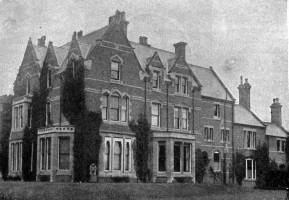 Her father had a large house built for the family at Wergs Road, Tettenhall, called "Woodthorne". They seem to have had at least six or seven servants even before they moved to their custom-built house. As early as the 1861 census when the family were living at 106 Race Course, Wolverhampton, with no children beyond Ellen, the household consisted of a wet nursemaid, cook, two housemaids and a groom. By 1891, with three grown-up children still residing at home they had a butler, footman, cook, ladies maid, two housemaids and a kitchen maid. Ellen's books reflect this and the high society circles she lived in, but they also show a surprising empathy with those from poorer backgrounds, possibly as a result of her Methodist upbringing. However, she was by no means a socialist and again in The Farringdons the puddler, Caleb Bateson is having a discussion with the rich young Alan Tremaine who has a good deal of sympathy with socialism, believing he would feel it hard if he were poor and other men, probably worse than himself, were rich:
Her father had a large house built for the family at Wergs Road, Tettenhall, called "Woodthorne". They seem to have had at least six or seven servants even before they moved to their custom-built house. As early as the 1861 census when the family were living at 106 Race Course, Wolverhampton, with no children beyond Ellen, the household consisted of a wet nursemaid, cook, two housemaids and a groom. By 1891, with three grown-up children still residing at home they had a butler, footman, cook, ladies maid, two housemaids and a kitchen maid. Ellen's books reflect this and the high society circles she lived in, but they also show a surprising empathy with those from poorer backgrounds, possibly as a result of her Methodist upbringing. However, she was by no means a socialist and again in The Farringdons the puddler, Caleb Bateson is having a discussion with the rich young Alan Tremaine who has a good deal of sympathy with socialism, believing he would feel it hard if he were poor and other men, probably worse than himself, were rich:
"And so it would be hard, sir, if this was the end of everything, and it was all haphazard...But when you rightly understand as it's all the Master's doing, and that He knows what He's about a sight better than we could teach Him, it makes a wonderful difference. Whether we're rich or poor, happy or sorrowful, is His business and He can attend to that; but whether we serve Him rightly in the place where He has put us, is our business, and it'll take us all our time to look after it without trying to do His work as well...[people] have got to do the work that the Lord has set them to do, and not...go hankering after each other's. Why, Mr Tremaine, if at our place the puddlers wanted to do the work of the shinglers, and the shinglers wanted to do the work of the rollers, and the rollers wanted to do the work of the masters, the Osierfield wouldn't be for long the biggest of ironworks in Mershire."
 Ellen had two younger siblings, Edith Henrietta born in 1865 who also became a novelist and Henry Ernest born c.1870. The girls were educated at home, and judging from various books mentioned in her novels the literature they read was a mixture of the morally improving, such as Mrs Sherwood's The Fairchild Family and Henry Milner, Sunday school best sellers such as the American Susan Warner's tearjerkers The Wide, Wide World and Queechy and Charlotte M Yonge's novels such as the Heir of Redclyffe, the Daisy Chain and the Pillars of the House. Not all of these were necessarily taken seriously, but, as a character in Ellen's novel, Concerning Isabel Carnaby states:
Ellen had two younger siblings, Edith Henrietta born in 1865 who also became a novelist and Henry Ernest born c.1870. The girls were educated at home, and judging from various books mentioned in her novels the literature they read was a mixture of the morally improving, such as Mrs Sherwood's The Fairchild Family and Henry Milner, Sunday school best sellers such as the American Susan Warner's tearjerkers The Wide, Wide World and Queechy and Charlotte M Yonge's novels such as the Heir of Redclyffe, the Daisy Chain and the Pillars of the House. Not all of these were necessarily taken seriously, but, as a character in Ellen's novel, Concerning Isabel Carnaby states:
...a man who now-a-days could read such books as The Fairchild Family and Stories from the Church Catechism without a smile, would be lacking in a sense of humour; but a man who sneered at the underlying godliness thus quaintly embodied, would be deficient in true reverence and spiritual insight.Perhaps as a result of the Susan Warner influence, many of Ellen Thorneycroft Fowler's heroines are orphans and generally do not have siblings. It is possible she wished she was an only child at times, but in The Farringdons she declares, "So does the love of a brother whom we have seen, help us in some measure to understand the love of the God Whom we have not seen; for which we owe the brother eternal thanks," and in a short story, My Matrimonial Agency published in Woman at Home the daughter of the story remarks, "Girls with a shoal of sisters don't get nearly as much of their own way as I do. People always think more of an odd cup-and-saucer than of a whole tea-set; and yet I sometimes think it must be jollier to be one of a tea-set after all."
In her late teens Ellen attended a private school in London, possibly the template for the idyllic Fox How School in The Farringdons that attempted not to teach the girls "how to be scholars", but rather, "how to be themselves" and it "always turned out ladies". Her brother became an Oxford undergraduate, but Ellen had to return home once her schooling was finished. She remained in the parental home until she was 43 years old, spending three months of each year in London. Both the girls were encouraged to write from an early age by their father, Ellen claiming to have begun at the age of seven.
Her first major publication was a volume of Songs and Sonnets published in 1888. Encouraged to write fiction by a family friend, Sir William Robertson Nicoll, she published her first novel, Cupid's Garden in 1897. Her second, Concerning Isabel Carnaby (1898) made her name and became a bestseller - the author Edna Lyall certainly enjoyed it, stating in a letter to her aunt, “M. gave me Concerning Isabel Carnaby. It does well for reading aloud and seems most clever.” The novel is semi-autobiographical in a number of ways since it concerns a Methodist family and community, a struggling writer who later becomes a liberal MP and a slice of high society. Her next two novels, A Double Thread (1899) and The Farringdons (1900) were set in and around Wolverhampton, Tettenhall and Sedgley under disguised names, a setting she thenceforth used in the majority of her fiction.
She continued to write poetry, short stories and novels, contributing to such magazines as the Girl's Own Paper, Woman at Home and the Pall Mall Magazine. Furthermore, her novel, A Double Thread, which had a rather Shakespearian plot of dual identity, was performed successfully as a play.
Her fiction, generally set in the Black Country is characterised by the wit and humour which runs through the Methodism and spiritual crises of her characters. Her observations in A Double Thread must strike a chord with anybody who has ever regularly attended a church:
"I saw you at church on Sunday morning, Mrs Cottle," she began; "and I want to know what you think of the new collection-bags, or rather I suppose I ought to call them alms-bags. Julia said to me only this morning, 'Mamma, it is very old-fashioned to talk of collections; alms is the proper expression.' But we get very old-fashioned without the young folks to teach us, don't we?" And Mrs Welford laughed...Ellen herself seems to have had a very strong Christian faith and although not a Methodist herself, she shared some of their tenets, producing a temperance tract, How to Make an Angel in 1901.
But the mention of the alms-bags had touched too serious a chord in the mind of Mrs Cottle for any levity to be possible to her..."I did not approve of them at all, Mrs Welford - not at all; and I wonder how Mr Bailey could have countenanced such things."
"Take my word for it, they are the thin end of the wedge," added Mrs Brown, with much sorrow of heart and some confusion of metaphor.
"At first when I saw them I thought of leaving the church altogether, and driving every Sunday morning into Clarewell, where they have collection-plates," continued Mrs Cottle; "nice, straightforward things, you know, where all is open and above-board, and there is no mystery...What does Mr Welford think of them?"...
"Oh! my dear, fortunately he was so much occupied in seeing that the new organist didn't introduce any innovations into the service, that he quite overlooked the bags..."
"I do not like to make mischief, nor to bear false witness against my neighbours...," said Mrs Brown..."[but] I hear that there are four different sets of collection-bags, in four different colours, for various festivals of the Church."
There was a moment's pause of horror, and then Miss Barber gasped: "I never heard such a thing in my life - never!"
On 16th April, 1903 Ellen Thorneycroft Fowler married Alfred Laurence Felkin, the son of the manager of the local "Mander's Paint and Varnish Works". Alfred, himself, was a senior teacher at the Royal Naval School at Mottingham, now Eltham College and later became an Inspector of Schools. The couple moved to Wayside in Eltham, where Ellen continued to write. She and her husband co-wrote a love story entitled, Kate of Kate Hall in 1904.
In 1916, in the midst of the First World War, the couple moved to Westbourne in Bournemouth. This was partly for the sake of Ellen's health. They remained there until her death. Her last book, Signs and Wonders was written in 1926. She died on the 22nd June, 1929, and is buried with her husband at All Saints, Branksome Park, Poole.
With especial thanks to my mum for researching the Census informationConcerning Isabel Carnaby (1898)
Lady Farley laughed. "I think our conversation is greatly affected by our clothes," she remarked. "I can never administer a social snub properly unless I am wearing either fur or diamonds; and I couldn't possibly pray in a hat, or without a veil."
A Double Thread (1899)
Emmeline continued to watch the Harland party with envy. "They seem to be having lots of fun," she said, with a sigh.
Mrs Cottle shook her head. "My dear Emmeline, how often must I tell you that there is nothing so vulgar as fun! It shocks me to see young women laughing heartily; real ladies only smile."
Mrs Cottle was frequently "shocked." She considered it a prerogative of gentility.
"Still, mamma, it must be nice to have several beaux at once - especially such nicely dressed ones."
"My word, Emmeline, what common ideas you have! I cannot imagine where you get them from, as your dear papa and I have always been so refined in our ideas, and have never let our children mix with anybody except well-to-do people. It is positively shocking to hear you talk in that way!"
The Farringdons (1900)
"Do you hear that noise?" said Elisabeth, one afternoon in the holidays, when she was twelve..."that's Mrs Bateson's pig being killed...Let's go and see it," Elisabeth suggested.
Christopher looked shocked. "Well, you are a horrid girl! Nothing would induce me to go, or to let you go either; but I'm surprised at your being so horrid as to wish for such a thing."
..."Of course, I don't want to go if you think it would be horrid of me; but I thought we might pretend it was the execution of Mary Queen of Scots, and find it most awfully exciting."
Fuel of Fire (1902)
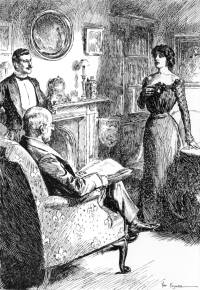 "She hasn't had much waiting on in late years, poor lady!" said Faith with a sigh.
"She hasn't had much waiting on in late years, poor lady!" said Faith with a sigh.
"No more she has, miss; and it don't seem becomin' somehow. I shall niver forgit the first time I saw her come inta the kitchen at Poplar Farm to give an order herself, instead o' ringin' the bell for the footman to take it, as she used to du up at the Hall. I remember onst when I was in service it give me such a turn as niver was when I see the kitchenmaid mix the mustard in one o' the room tea-cups. 'Yew must always use a kitchen tea-cup for mixing the mustard in, yew careless hussy,' I says; 'and niver let me see yew speak disrespectfully o' one of the room tea-cups agen.' And it give me just such another turn when I see her leddyship come inta the kitchen at Poplar Farm."
Her Ladyship's Conscience (1913)
"But never mind inequalities of position," continued Westerham, "think of inconsistencies of character; they are also explained by my reincarnation theory. Look at yourself, for instance; you are partly a pantheistic nymph and partly a devout nun - by no means suitable spirits to be packed into the same envelope. But explain it by the idea that you have been both a nymph and a nun, and some of the attributes of each still survive in your character."
"Oh, Wilfred, how interesting and how true! And they not only survive, they fight with each other."
Place and Power (1903)
"Griselda," her father said..."do you understand that in touching the accursed thing and yoking yourself in fellowship with an unbeliever, you are sinning against the living God?"
"No, father; I only understand that I love Conrad Clayton with all my heart, and that whenever he calls I must follow."
"Blind girl!" thundered forth Josiah. "Are you so besotted with the temptations of the flesh and the devil that you cannot see whither your steps are tending? Know you not that when this infidel gets hold of you body and soul, he will make you tenfold more a child of hell than himself; and that God will surely bring you to judgment for your deadly sin in choosing darkness rather than light? Is mere earthly happiness of such moment to you that you will buy it at the cost of your immortal soul?"
A FORSAKEN IDOL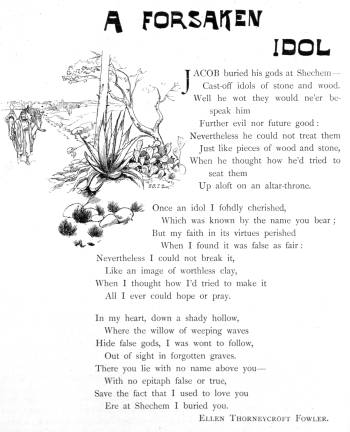
Jacob buried his gods at Shechem -
Cast-off idols of stone and wood.
Well he wot they would ne'er bespeak him
Further evil nor future good:
Nevertheless he could not treat them
Just like pieces of wood and stone,
When he thought how he'd tried to seat them
Up aloft on an altar-throne.
Once an idol I fondly cherished,
Which was known by the name you bear;
But my faith in its virtues perished
When I found it was false as fair:
Nevertheless I could not break it,
Like an image of worthless clay,
When I thought how I'd tried to make it
All I ever could hope or pray.
In my heart, down a shady hollow,
Where the willow of weeping waves
Hide false gods, I was wont to follow,
Out of sight in forgotten graves.
There you lie with no name above you -
With no epitaph false or true,
Save the fact that I used to love you
Ere at Shechem I buried you.
Dear Madam, I have some hesitation in adding another letter to the number you are sure to receive, but I have so very much enjoyed The Farringdons, and want just to thank you most heartily for it.
For two months I have been ill in bed, owing to the cold and the troubles of this sad winter.
But last Sunday the warm weather and The Farringdons came in together, and I was able to sit out of doors and revel in both. We have all of us enjoyed your other books, but this seems to me even better than the earlier ones - its humour is delightful, its heroine most thoroughly human, and I found it excellent Sunday reading for one cut off for the time from Church services - the sort of book that really gives one a lift on the uphill road. I shall look forward eagerly to the publication of your next book. With all best wishes and warm congratulations...
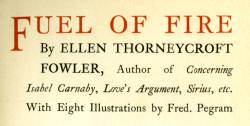 A Double Thread
A Double ThreadReminiscent of Mrs Henry Wood's East Lynne (1861) in which Lady Isabel runs off with her lover Sir Francis Levison to Grenoble, leaving her dull husband behind her in England. After bearing his child and subsequently parting from him she quits Grenoble by rail: |
The Lower Pool Miss ELLEN THORNEYCROFT FOWLER has travelled a long way since the days when she wrote Concerning Isabel Carnaby and A Double Thread. Occasionally in The Lower Pool (HUTCHINSON) she recalls her old gift for epigram, but for the most part she is almost overwhelmingly serious. The tale is told by a Victorian lady who, not entirely without reason, thinks that her children may not be amused by what she has written. Her mother was married to Lord Merchester, a desperately unhappy man who in his younger days had dispensed with religion. As an antidote to this sceptical peer we are given a most perfect clergyman, Adrian St Just, a really delightful man but conversationally a little too improving. I believe, however, far more sincerely in the parson's goodness than in Merchester's many and various iniquities. The narrator's own love-stories are pathetic to the point of tears; but the concluding words of the book (I am not counting the epilogue) make amends: "In an ecstasy of joy I awoke, and behold it was morning, and the sun had risen upon the earth." This sounds all right.(Punch, Vol. CLXIV, March 28, 1923)
Ellen Thorneycroft Fowler's cousin, the Reverend John Thorneycroft Hartley, won the All England Lawn Tennis Championships (now commonly known as "Wimbledon") in 1879 and 1880 and was runner up in 1881. In his first final he beat the gambling Irishman, Vere St Leger Gould. Gould was one of the earliest players noted for coming off the base line and the first Wimbledon finalist to be convicted of murder, killing a wealthy Danish widow in 1907.